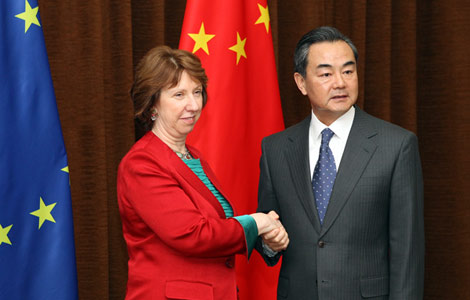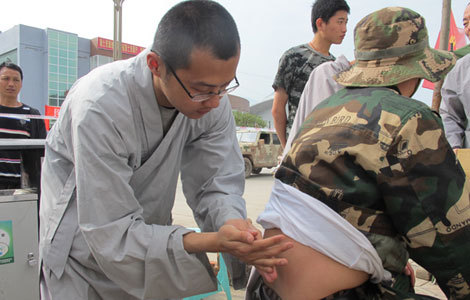China cuts gov't intervention to push reforms
Updated: 2013-04-27 01:49
(Xinhua)
|
||||||||
BEIJING - In a gesture to push forward reforms in the world's most populous nation, the State Council - headed by Premier Li Keqiang - introduced changes to itself by starting to cut intervention in investment and production activities.
In an executive meeting on Wednesday, the State Council, or China's cabinet, announced it would cancel or delegate power to lower levels concerning 71 items that were previously subject to central government administrative approval.
The move that allows local governments to have a greater say in approving local investment projects is a result of a plan passed by China's top legislature to push institutional reform and transform government functions.
Government functions at ministerial level need to be changed to reduce administrative intervention in the market and on social issues as part of the country's efforts to build an efficient and law-based government with a clear division of power, reasonable distribution of labor and well-defined responsibilities, according to a report adopted by the National People's Congress last month.
Analysts said central government hopes to inject a fresh dynamic and vitality into the economy and social development through such transformation as the country has ushered into a medium-speed growth era after three decades of almost two-digit expansion.
"With fewer items subject to administrative approval, the new government has shown its determination to facilitate market-oriented reform," said Nie Gaomin, director of Economic Structure and Management Institute with the National Development and Reform Commission, the country's top economic planner.
Since 2001, the State Council has introduced six rounds of reforms cancelling or adjusting its intervention in more than 2,400 investment and production items.
"The next reform should begin with the government itself," said Chi Fulin, director of the China (Hainan) Institute for Reform and Development.
"Reducing administrative approval items may be a minor step, but it could lead to major reforms in the country," Chi said.
Moreover, to remove or delegate the power of approving such investment and production projects by central government could also open up more opportunities for the private sector and help stabilize short-term growth.
The reform plan passed by the top legislature in March also pledged to minimize the inconveniences and high costs involved when enterprises and individuals are trying to obtain the services they require and boost their independence to start a business or make an investment.
For those investment projects still subject to state approval, the plan introduces a deadline for completing the application process, as well as simplified procedures for each case, while emphasizing enhanced management over land use, energy consumption and emissions of pollutants to prevent duplication in investment and disorderly competition, according to the plan.
Experts said after more than 30 years of gradual reforms, China has almost completed its market-oriented reform in the commodity-related sector, but still retained tight control over the monopoly industries and factors concerning production, or segments related to land, labor and capital.
"We should deepen reforms to ensure companies of different ownership can participate in fair and open market competition, equally accessing land, labor and capital," Nie said.
Most Viewed
Editor's Picks

|

|

|

|

|

|
Today's Top News
China, EU 'to renew ties'
Life goes on after Lushan earthquake
TEDA inks investment agreement with Egyptian govt
Industries post lower profit growth
China, EU agree to beef up cooperation
China's court hears Jordan suit
Top charitable donor list published
China's retrieval of lost relics needs time
US Weekly

|

|














